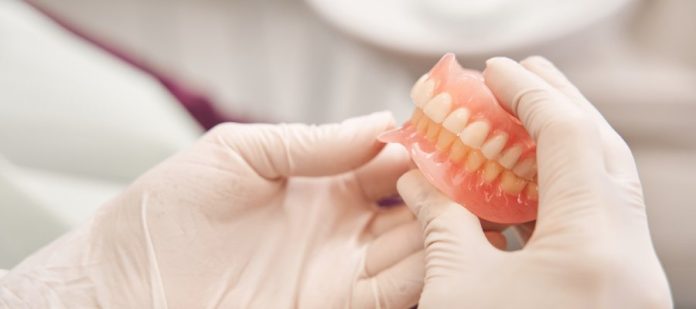Getting dentures for the first time can feel overwhelming. Many people wonder how to care for their new teeth properly and what mistakes to avoid. The do’s and don’ts for first-time denture wearers will help you navigate this transition smoothly and maintain your oral health.
Protect your investment, prevent damage, and feel confident with your new smile. Following these proper care techniques from day one makes all the difference.
Do: Soak Your Dentures Overnight
Remove your dentures every night before bed. Soaking them in a denture cleaning solution or plain water keeps them moist and prevents warping. Your gums also need time to rest and recover from wearing dentures all day.
Choose a denture-specific soaking solution rather than regular mouthwash, as mouthwash can damage denture materials. Clean water works as an alternative if you run out of cleaning solution.
Don’t: Use Hot Water
Hot water warps dentures and changes their shape. This makes them fit poorly and causes discomfort. Always rinse your dentures with lukewarm or cool water instead.
Temperature changes can also weaken the denture material over time. Stick to room temperature water for cleaning and soaking to maintain the proper fit.
Do: Clean Them Daily
Brush your dentures every day with a soft-bristle brush and denture cleaner. Food particles and bacteria build up just as they do on natural teeth. Regular cleaning prevents stains, odors, and oral health problems.
You should avoid regular toothpaste, which contains abrasives that scratch denture surfaces. These scratches create hiding places for bacteria, making your dentures harder to clean.
Don’t: Sleep with Your Dentures In
Wearing dentures overnight increases your risk of gum irritation and infections. Your mouth produces less saliva while you sleep, creating an environment where harmful bacteria thrive.
Taking dentures out at night allows your gums to breathe and recover. This simple habit prevents many common denture-related problems.
Do: Cut Food into Small Pieces
Large pieces of food put unnecessary stress on your dentures and gums. Cut meat, vegetables, and other foods into smaller, manageable pieces before eating. Chew slowly and evenly on both sides of your mouth. This helps distribute pressure evenly and prevents your dentures from shifting or becoming loose during meals.
Don’t: Use Your Dentures as Tools
Avoid using your dentures to open packages, bite nails, or hold objects, because these actions can cause irreparable damage. Careless handling can reduce their lifespan. Biting on hard foods like ice, nuts, or tough candies can also harm them. Poor habits, such as using dentures for anything other than eating, may lead to damage.
Do: Maintain Regular Dental Checkups
Schedule appointments with your dentist every six months, even with dentures. Your mouth changes over time, and dentures may need adjustments to maintain a proper fit. Regular checkups catch problems early and help prevent more serious issues. Your dentist can also professionally clean your dentures and check your oral health.
Don’t: Let Them Dry Out
Dentures become brittle and can crack when they dry out completely. Always store them in water or denture solution when not wearing them. Even short periods without moisture can cause problems. Keep a travel case with a solution if you need to remove your dentures during the day.
Protecting Your New Investment
Following these essential guidelines for new denture wearers helps you avoid costly repairs and uncomfortable problems. Good habits formed early will serve you well throughout your denture-wearing experience.
Your dentures can last many years with proper care and regular dental visits. Take time to develop these healthy routines, and you’ll enjoy eating, speaking, and smiling with confidence.






















